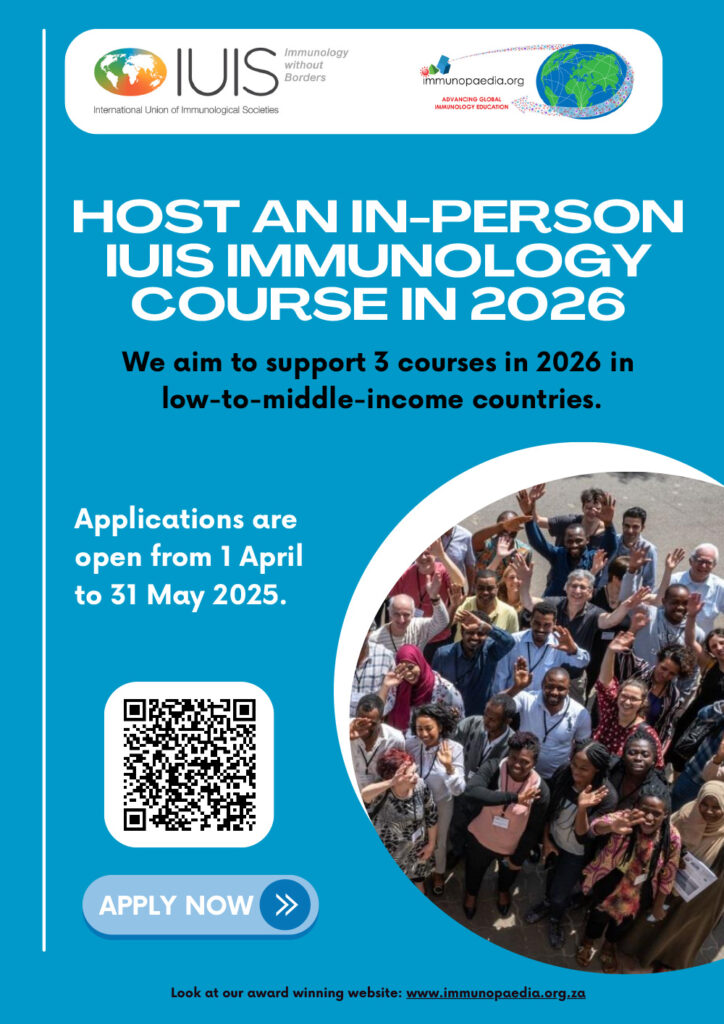IUIS Courses 2025

How to organize an IUIS Immunology Course

The following provides a guideline for the organization of an IUIS Immunology Course. Please get back to the Education Committee (EDU) for further details and questions.
- EDU-sponsored IUIS Immunology Courses are usually one-week regional courses, which take place in low-to-middle-income countries. Typically, IUIS courses do not take place in association with another congress/meeting, with the possible exception as a first step to explore new regions. So far, the focus has been on Africa and Latin America, but other regions (e.g., Asia) will be considered. The EDU budget allows to partially support three courses per year. EDU does not co-finance established courses and “schools” in developed regions (e.g., Europe, US). However, EDU supports travel fellowships to selected established courses (such as the AAI Introductory and Advanced courses, and the German Society of Immunology (DGfI) Spring School).
- The EDU support will not suffice to fully cover the expenses of the course. Therefore, additional funds will need to be raised (e.g., from industry, your Regional Federation, private foundations, etc.). Ideally, participation for students is free (i.e., travel expenses and accommodation are covered). If not possible, a reasonable registration fee can be charged, and then students can apply for awards to cover their registration and travel.
- The topic, country and location of an IUIS Immunology Course should be selected in agreement with the relevant Regional IUIS Federations (i.e., ALACI, FAIS, FIMSA) and should be based on the immunological topics most relevant to the particular area. While IUIS courses take place in person, a virtual session and/or a practical part/workshop might be included if appropriate.
- According to our experience, the preparation of an IUIS course takes 12 months. Therefore, the local organizers should begin early with the planning, have regular Zoom meetings with the EDU executive, and establish a timeline.
- As the local organizer, you should develop ideas regarding the topics of the course and potential faculty. Contact EDU at an early stage so that we can support the organization (also with suggestions for potential faculty members and our available resources).
- The faculty (15–20 people) usually consists of a balance of local/national and international experts. Make sure that the speakers are willing (and able) to teach; an IUIS course is not a congress! When selecting the potential faculty, consider gender balance. Faculty members should stay through the whole course and not just fly in and out again. This is a unique opportunity for the participants to closely interact with national and international experts. Faculty will be provided with accommodation and food during the course. However, they might be asked to provide their own air travel, if sufficient funds for the course cannot be raised.
- Try to have students and faculty stay at the same hotel. Meeting people at breakfast or dinner greatly enhances the interactions!
- IUIS courses are highly interactive. When organizing the program, leave sufficient time for poster sessions, meet-the-expert round table discussions, grant writing exercises, exercises on how to write a scientific CV, how to apply for fellowships, etc.
- The IUIS course should be advertised widely and in time. The process is facilitated by the Immunopaedia team, who sets up the registration pages and helps with the selection process of participants, organized by EDU Committee members. Selection takes place once all applications have been received and is based on CV, motivation letter, supervisor’s support letter, and abstract.
- For each IUIS course, educational materials will be made available to participants approximately 6 weeks before the course commences, using the Immunopaedia platform (www.immunopaedia.org). Immunopaedia is IUIS-supported and is designed to provide core and specific themed modules on immunology. The pre-course material is organized by Immunopaedia. The Immunopaedia team (chaired by Clive Gray) will work closely with you and your team to collect and prepare immunology material from the invited speakers. This allows the registered students to prepare themselves for the course before arrival, so that the basic core knowledge of immunology is covered prior to the course. It is advisable that you identify two or three PhD or post-doctoral fellows who can take over the responsibility to contact the speakers in time and to adapt the material that can be used on the Immunopaedia platform.
IUIS EDU Committee | Immunopaedia

FOCIS European Advanced Course & Conference on Immunology and Immunopathology 2025
Following the great success of the FOCIS (Federation of Clinical Immunology Societies) European Advanced Course and Conference on Immunology in Rouen in 2023, a new edition of the course will take place from October 20 to 24, 2025 in Rouen. A rich program featuring the participation of international and national leaders in the field of immunology will address key topics in cellular and molecular immunology with a clinical focus, including the mechanisms involved in innate and adaptive immunity, the basis of immune-mediated diseases, cancer immunology and recent advances in interventional immunology and immunotherapy. A workshop will enable participants to acquire essential skills in clinical trial design and protocol writing. Junior researchers will have the opportunity to present their own work as a poster or oral communication (submission of a scientific abstract is optional). Poster prizes and travel grants are offered by FOCIS, IUIS and AFM. This course will offer participants the opportunity to interact closely and network with leading scientists in the field of immunology.
For more information (program, travel grants and registration), visit https://focis2025.univ-rouen.fr/index.php
R-E-G-I-S-T-E-R BEFORE JUNE 1st TO BENEFICIATE FROM REDUCED RATES